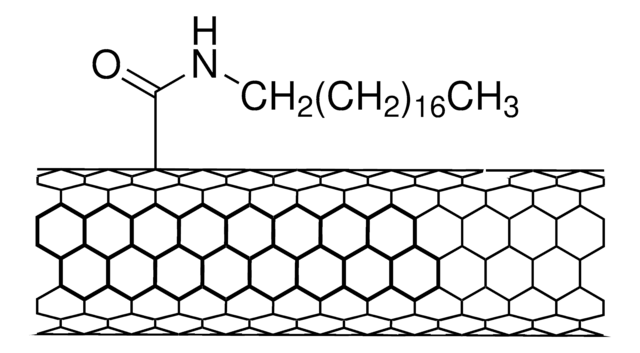639230
Carbon nanotube, single-walled
polyaminobenzene sulfonic acid functionalized, 75-85%carbon basis, D × L 1.1 nm × 0.5-1.0 μm , bundle dimensions
Synonyme(s) :
Carbon nanotube, single-walled, PABS functionalized, SWNT, PABS functionalized
About This Item
Produits recommandés
Nom du produit
Carbon nanotube, single-walled, polyaminobenzene sulfonic acid functionalized, 75-85% carbon basis, D × L 1.1 nm × 0.5-1.0 μm , bundle dimensions, avg. no. of layers, 1
Niveau de qualité
Essai
75-85% carbon basis
Forme
powder
Poids mol.
average Mw 400-600 g/mol (PABS)
Caractéristiques
avg. no. of layers 1
Ampleur du marquage
65% (PABS, typical)
P × L
1.1 nm × 0.5-1.0 μm , bundle dimensions
Impuretés
4% metals
Solubilité
ethanol: 0.05 mg/mL
DMF: 0.1 mg/mL
H2O: 5.0 mg/mL (As determined by near-IR absorbance spectroscopy.)
Groupe fonctionnel
sulfonic acid
Catégories apparentées
Description générale
Application
Conditionnement
Notes préparatoires
Remarque sur l'analyse
Mention d'avertissement
Warning
Mentions de danger
Conseils de prudence
Classification des risques
Eye Irrit. 2 - STOT SE 3
Organes cibles
Respiratory system
Code de la classe de stockage
11 - Combustible Solids
Classe de danger pour l'eau (WGK)
WGK 3
Point d'éclair (°F)
Not applicable
Point d'éclair (°C)
Not applicable
Équipement de protection individuelle
dust mask type N95 (US), Eyeshields, Gloves
Faites votre choix parmi les versions les plus récentes :
Déjà en possession de ce produit ?
Retrouvez la documentation relative aux produits que vous avez récemment achetés dans la Bibliothèque de documents.
Les clients ont également consulté
Articles
Carbon nanotubes are materials that possess remarkable properties and offer extraordinary possibilities.
Carbon nanotubes (CNTs) have received much attention since their discovery in 1991 by Sumio lijima1 due to their excellent mechanical, electrical, and optical properties.
A nanocomposite is typically defined as a mixture between a host material (e.g., polymer matrix) and nanofillers with at least one dimension of less than 100 nm.
SWCNTs show promise in FETs, solar cells, and photodetectors due to their ultrafast charge transport mobility.
Notre équipe de scientifiques dispose d'une expérience dans tous les secteurs de la recherche, notamment en sciences de la vie, science des matériaux, synthèse chimique, chromatographie, analyse et dans de nombreux autres domaines..
Contacter notre Service technique











